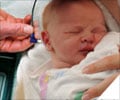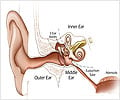Long-term hearing loss caused by loud explosions that was previously thought to be untreatable could in fact be treated, says a new study.

"It means we could potentially try to reduce this damage," said John Oghalai, MD, associate professor of otolaryngology and senior author of the study.
In order to determine exactly what is causing the permanent hearing loss, Stanford researchers created a mouse model to study the effects of noise blasts on the ear.
After exposing anesthetized mice to loud blasts, researchers examined the inner workings of the mouse ear from the eardrum to the cochlea. The ears were examined from day one through three months. A micro-CT scanner was used to image the workings of the ear after dissection.
"When we looked inside the cochlea, we saw the hair-cell loss and auditory-nerve-cell loss," Oghalai said.
"With one loud blast, you lose a huge number of these cells. What's nice is that the hair cells and nerve cells are not immediately gone. The theory now is that if the ear could be treated with certain medications right after the blast, that might limit the damage," he explained.
Advertisement
Source-ANI














